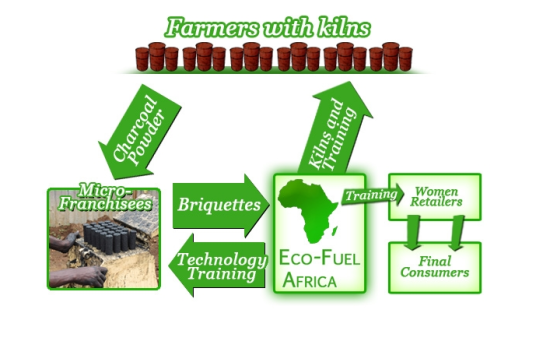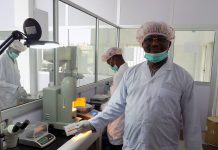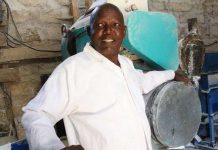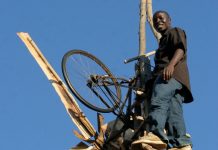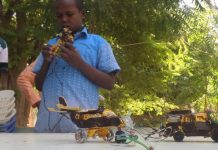(A column highlighting scientific, technological, engineering, and design innovation in Africa)
Ugandan accountant and social entrepreneur Moses Sanga developed a low-cost, easy-to-access system to produce both briquettes that can be used for clean-energy cooking and organic fertilizer.
Traditionally, charcoal used for cooking is produced by burning wood. The wood is obtained by cutting down trees, contributing to forest depletion and climate change. With over 80 percent of sub-Saharan Africans depending on wood fuel, Africa loses nearly 10 million acres of forest each year.
Moreover, many girls are kept out of school to gather and haul bundles of wood home. Farmers, meanwhile, do not recycle their crop waste. Instead, they burn the waste to dispose of it.
Sanga, founder and CEO of Eco-Fuel Africa Ltd., says his goal is to provide 40 million Africans with affordable clean energy and plant at least a quarter of a billion trees by 2020.
Eco-Fuel Africa’s system produces clean burning “biochar briquettes” by carbonizing agriculture waste (crop residue). A network of local farmers trained by Eco-Fuel supplies the crop waste in the form of charcoal powder, which the farmers produce in kilns invented by Eco-Fuel using oil drums and leased to them for about US$30 each. The farmers retain 20 percent of the charcoal powder to make an organic fertilizer, which is said to have increased agricultural productivity on average by 50 percent.
Eco-Fuel mixes the powdered waste, or biochar, with other ingredients in hydraulic presses to produce briquettes. Because the presses are hydraulic, they require no electricity.
The briquettes, which first landed on the market in 2010, cost 20 percent less than wood-carbonized charcoal. They burn smoke-free, making cooking healthier than over wood or charcoal and reducing the tedium of pot scrubbing.
In addition to providing low-cost, clean-energy cooking briquettes and fertilizer, Eco-Fuel Africa generates income for a network of suppliers, distributors and transporters, from farmers to teenagers employed to deliver briquettes on bicycles, to women recruited and trained by Eco-Fuel Africa to sell the briquettes at branded kiosks, to Eco-Fuel Africa franchisees.
Eco-Fuel Africa has planted more than 150,000 trees by distributing seedlings to schools and community groups. The company is a 2012 winner of a Tech Award from The Tech Museum of Innovation in San Jose, California.


